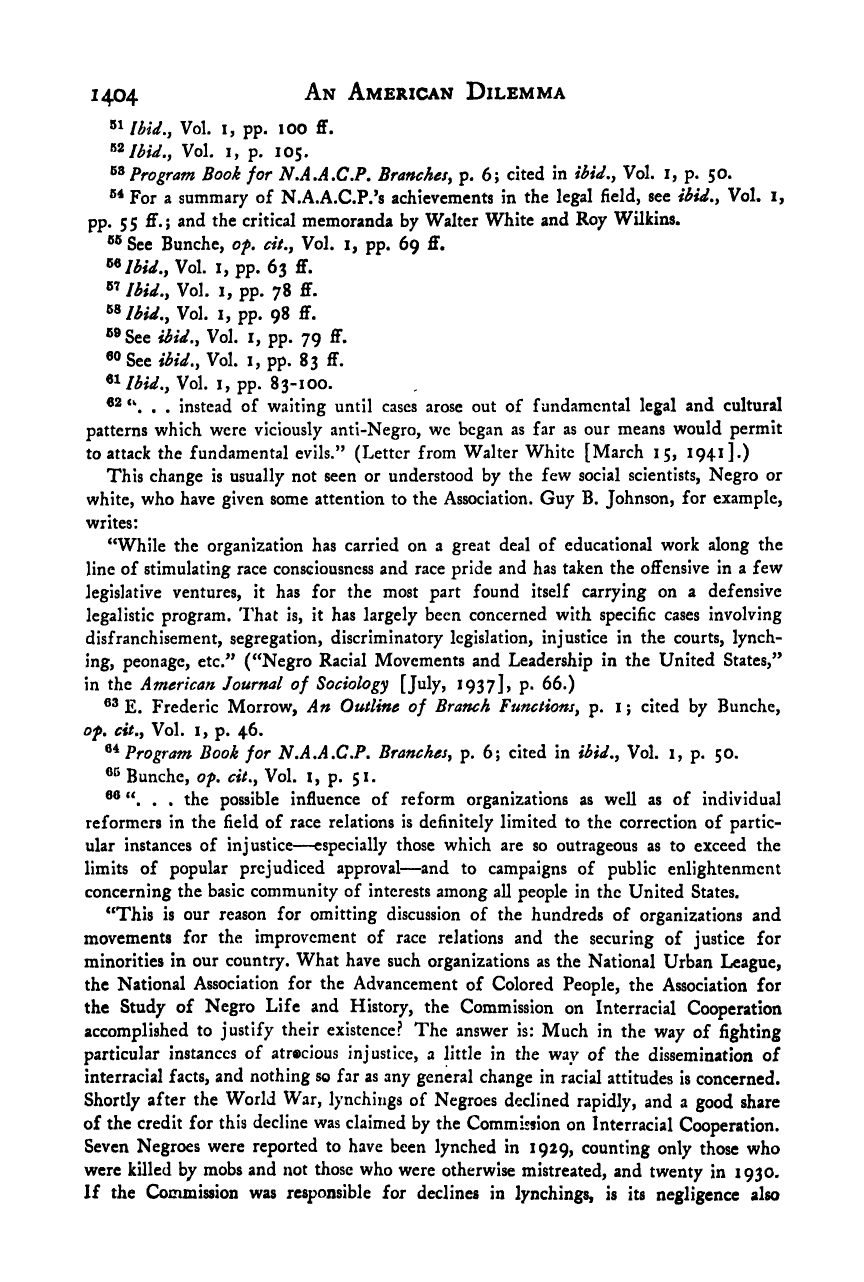Note: Gunnar Myrdal died in 1987, less than 70 years ago. Therefore, this work is protected by copyright, restricting your legal rights to reproduce it. However, you are welcome to view it on screen, as you do now. Read more about copyright.
Full resolution (TIFF) - On this page / på denna sida - Footnotes - Chapter 39

<< prev. page << föreg. sida << >> nästa sida >> next page >>
Below is the raw OCR text
from the above scanned image.
Do you see an error? Proofread the page now!
Här nedan syns maskintolkade texten från faksimilbilden ovan.
Ser du något fel? Korrekturläs sidan nu!
This page has never been proofread. / Denna sida har aldrig korrekturlästs.
An American Dilemma
1404
lbid,y Vol. I, pp. 100 S.
Ibid., Vol. I, p. 105.
Program Book for N.A.A.C.P. Branches, p. 6; cited in ibid., Vol. i, p. 50.
For a summary of N.A.A.C.P.’s achievements in the legal field, see ibid., Vol. i,
pp. 5 5 ff. ;
and the critical memoranda by Walter White and Roy Wilkins.
See Bunche, of, cit., Vol. i, pp. 69 ff.
^^Ibid., Vol. I, pp. 63 S.
Ibid., Vol. I, pp. 78 ff.
Ibid., Vol. I, pp. 98 ff.
®®See ibid., Vol. l, pp. 79 ff.
See ibid., Vol. i, pp. 83 ff.
Ibid., Vol. I, pp. 83-100.
. . instead of waiting until cases arose out of fundamental legal and cultural
patterns which were viciously anti-Negro, we began as far as our means would permit
to attack the fundamental evils.” (Letter from Walter White [March 15, 1941].)
This change is usually not seen or understood by the few social scientists, Negro or
white, who have given some attention to the Association. Guy B. Johnson, for example,
writes:
“While the organization has carried on a great deal of educational work along the
line of stimulating race consciousness and race pride and has taken the offensive in a few
legislative ventures, it has for the most part found itself carrying on a defensive
legalistic program. That is, it has largely been concerned with specific cases involving
disfranchisement, segregation, discriminatory legislation, injustice in the courts, lynch-
ing, peonage, etc.” (“Negro Racial Movements and Leadership in the United States,”
in the American Journal of Sociology [July, 1937], p. 66.)
E. Frederic Morrow, An Outline of Branch Functions, p. i; cited by Bunche,
of, cit., Vol. I, p. 46.
Program Book for N.A.A.C.P. Branches, p. 6; cited in ibid., Vol. 1, p. 50.
Bunche, of, cit., Vol. l, p, 51.
“. . . the possible influence of reform organizations as well as of individual
reformers in the field of race relations is definitely limited to the correction of partic-
ular instances of injustice—especially those which are so outrageous as to exceed the
limits of popular prejudiced approval—and to campaigns of public enlightenment
concerning the basic community of interests among all people in the United States.
“This is our reason for omitting discussion of the hundreds of organizations and
movements for the improvement of race relations and the securing of justice for
minorities in our country. What have such organizations as the National Urban League,
the National Association for the Advancement of Colored People, the Association for
the Study of Negro Life and History, the Commission on Interracial Cooperation
accomplished to justify their existence? The answer is: Much in the way of fighting
particular instances of atr®cious injustice, a little in the way of the dissemination of
interracial facts, and nothing so far as any general change in racial attitudes is concerned.
Shortly after the World War, lynchiiigs of Negroes declined rapidly, and a good share
of the credit for this decline was claimed by the Commission on Interracial Cooperation.
Seven Negroes were reported to have been lynched in 1929, counting only those who
were killed by mobs and not those who were otherwise mistreated, and twenty in 1930.
If the Commission was responsible for declines in lynchings, is its negligence also
<< prev. page << föreg. sida << >> nästa sida >> next page >>